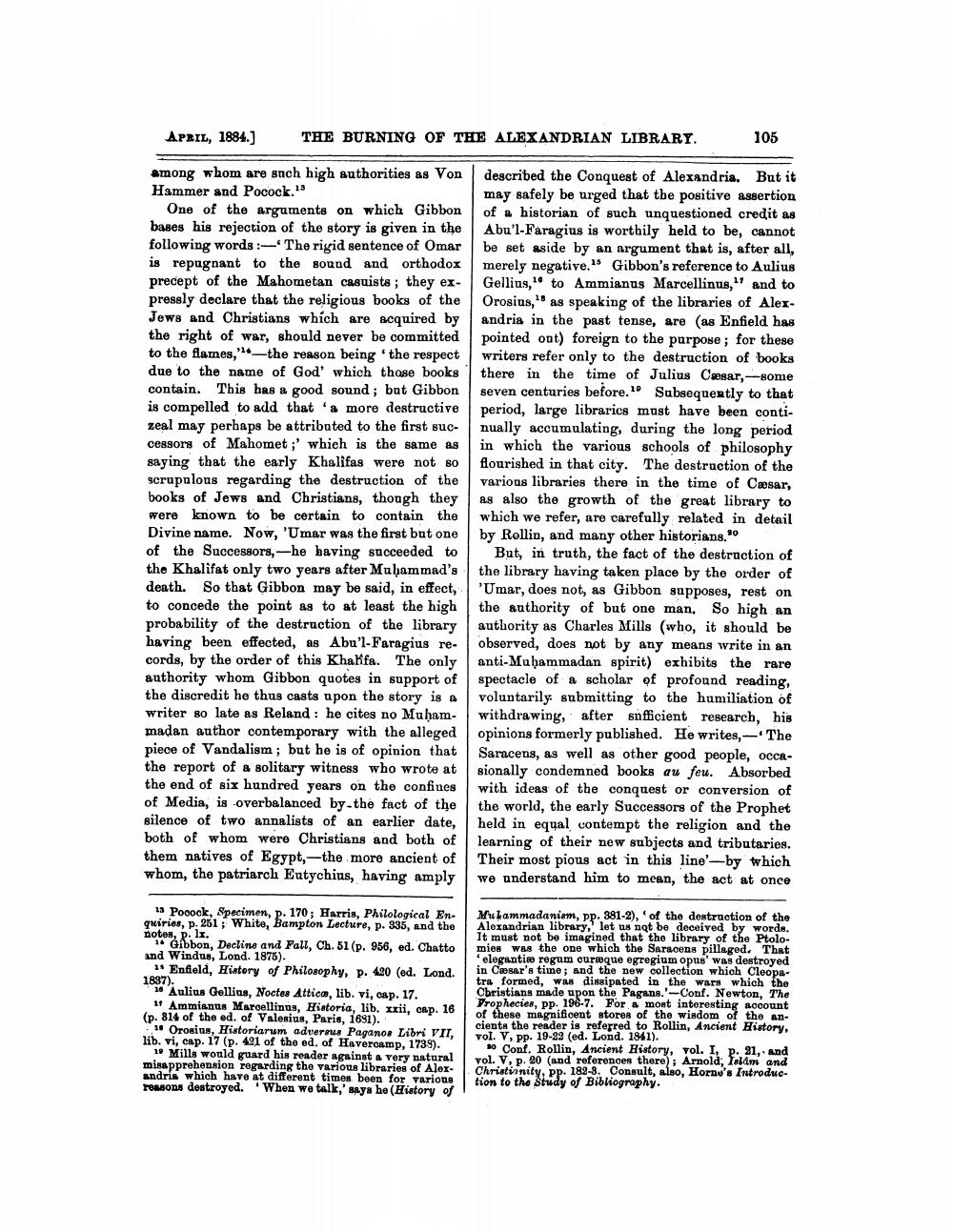________________
APRIL, 1884.)
THE BURNING OF THE ALEXANDRIAN LIBRARY
105
among whom are snch high authorities as Von Hammer and Pocock.
One of the arguments on which Gibbon bases his rejection of the story is given in the following words - The rigid sentence of Omar is repugnant to the sound and orthodox precept of the Mahometan casuists; they ex. pressly declare that the religious books of the Jews and Christians which are acquired by the right of war, should never be committed to the flames,'*the reason being the respect due to the name of God' which those books contain. This has a good sound; but Gibbon is compelled to add that 'a more destructive zeal may perhaps be attributed to the first suc- cessors of Mahomet;' which is the same as saying that the early Khalifas were not so scrupulous regarding the destruction of the books of Jews and Christians, though they were known to be certain to contain the Divine name. Now, 'Umar was the first but one of the Successors,-he having succeeded to the Khalifat only two years after Muhammad's death. So that Gibbon may be said, in effect, to concede the point as to at least the high probability of the destruction of the library having been effected, as Abu'l-Faragius records, by the order of this Khakifa. The only authority whom Gibbon quotes in support of the discredit he thus casts upon the story is a writer so late as Reland : he cites no Muhammadan author contemporary with the alleged piece of Vandalism; but he is of opinion that the report of a solitary witness who wrote at the end of six hundred years on the confines of Media, is overbalanced by the fact of the silence of two annalists of an earlier date, both of whom were Christians and both of them natives of Egypt, -the more ancient of whom, the patriarch Eutychius, having amply
described the Conquest of Alexandria. But it may safely be urged that the positive assertion of a historian of such unquestioned credit as Abu'l-Faragius is worthily held to be, cannot be set aside by an argument that is, after all, merely negative." Gibbon's reference to Aulius Gellius," to Ammianus Marcellinus," and to Orosius," as speaking of the libraries of Alerandria in the past tense, are (as Enfield has pointed out) foreign to the purpose ; for these writers refer only to the destruction of books there in the time of Julius Caesar,--some seven centuries before. Subsequently to that period, large libraries must have been continually accumulating, during the long period in which the various schools of philosophy flourished in that city. The destruction of the various libraries there in the time of Cæsar, as also the growth of the great library to which we refer, are carefully related in detail by Rollin, and many other historians,*
But, in truth, the fact of the destruction of the library having taken place by the order of 'Umar, does not, as Gibbon supposes, rest on the authority of but one man. So high an authority as Charles Mills (who, it should be observed, does not by any means write in an anti-Muhammadan spirit) exhibits the rare spectacle of a scholar of profound reading, voluntarily submitting to the humiliation of withdrawing, after snfficient research, his opinions formerly published. He writes, The Saracens, as well as other good people, occasionally condemned books au feu. Absorbed with ideas of the conquest or conversion of the world, the early Successors of the Prophet held in equal contempt the religion and the learning of their new subjects and tributaries. Their most pious act in this line'-by which we understand him to mean, the act at once
13 Pocock, Specimen, p. 170; Harris, Philological En. quiries, p. 261; White, Bampton Lecture, p. 335, and the notes, P. lx.
16 Gibbon, Decline and Fall, Ch. 51 (p. 956, ed. Chatto and Windus, Lond. 1876).
11 Enfield, History of Philosophy, p. 420 (ed. Lond. 1837).
10 Aulius Gellius, Noctes Attico, lib. vi, cap. 17.
11 Ammianus Maroellinus, Historia, lib. xxii, cap. 16 (p. 814 of the ed. of Valesius, Paris, 1691).
11 Orosius, Historiarum advero Paganos Libri VII, lib. vi, cap. 17 (p. 421 of the od. of Havercamp, 1739).
19 Mills would guard his reader against a very natural misapprehension regarding the various libraries of Aler. andris which have at different times been for various rosons destroyed. "When we talk,' says he (History of
Mukammadanism, pp. 381-2), of the destruction of the Alexandrian library, let us not be deceived by words. It must not be imagined that the library of the Ptolomies was the one which the Saracens pillaged. That * elegantix regum curæque egregium opus' was destroyed in Cæsar's time; and the new collection which Cleopatra formed, Was dissipated in the wars which the Cbristians made upon the Pagans.' -Conf. Newton, The Prophecies, pp. 196-7. For most interesting account of these magnificent stores of the wisdom of the ancients the reader is referred to Rollin, Ancient History, vol. V, pp. 19-32 (ed. Lond. 1841).
10 Conf. Rollin, Ancient History, vol. I, p. 21, and vol. V. p. 20 (and references there): Arnold, Islam and Christinity, pp. 182-3. Consult, also, Horne's Introduc. tion to the Study of Bibliography.




